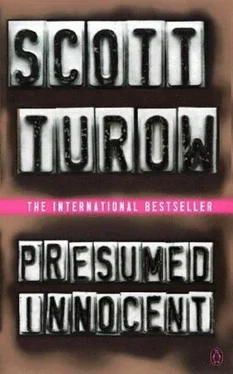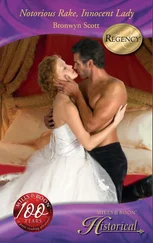Scott Turow - Presumed innocent
Здесь есть возможность читать онлайн «Scott Turow - Presumed innocent» весь текст электронной книги совершенно бесплатно (целиком полную версию без сокращений). В некоторых случаях можно слушать аудио, скачать через торрент в формате fb2 и присутствует краткое содержание. Жанр: Детектив, на английском языке. Описание произведения, (предисловие) а так же отзывы посетителей доступны на портале библиотеки ЛибКат.
- Название:Presumed innocent
- Автор:
- Жанр:
- Год:неизвестен
- ISBN:нет данных
- Рейтинг книги:4 / 5. Голосов: 1
-
Избранное:Добавить в избранное
- Отзывы:
-
Ваша оценка:
- 80
- 1
- 2
- 3
- 4
- 5
Presumed innocent: краткое содержание, описание и аннотация
Предлагаем к чтению аннотацию, описание, краткое содержание или предисловие (зависит от того, что написал сам автор книги «Presumed innocent»). Если вы не нашли необходимую информацию о книге — напишите в комментариях, мы постараемся отыскать её.
Presumed innocent — читать онлайн бесплатно полную книгу (весь текст) целиком
Ниже представлен текст книги, разбитый по страницам. Система сохранения места последней прочитанной страницы, позволяет с удобством читать онлайн бесплатно книгу «Presumed innocent», без необходимости каждый раз заново искать на чём Вы остановились. Поставьте закладку, и сможете в любой момент перейти на страницу, на которой закончили чтение.
Интервал:
Закладка:
At another table, he sees a friend, an older red-haired man. Sandy departs for a second to greet him. I review the pad I have brought along from the courthouse. but most of it has been covered in our discussion. Instead, I look out toward the city and, as usual, think about my father with despair. I had been wildly angry with him throughout that episode, both because of my own discomfiture and because I felt he had no right to seek attention after ignoring my mother's illness, then in its initial stages. But as I watched my father in Mulcahy's outer office, a worm of pain began to eat at my heart. In his distraction, my father, usually rigid about his personal hygiene, had failed to shave. His beard grew quickly and his cheeks were whitish with the stubble. He held the felt brim of his hat in his fingers and turned it in his hands. He had a tie on, which he seldom wore; the knot was a kind of crumbled mess pulled off to the side, and his shirt was soiled around the collar. He did not seem to fill his chair, or even his clothing. He looked at his feet on the floor. He appeared much older than he was. And terribly afraid.
I do not believe I had ever seen my father visibly frightened before that. His almost invariable mien was of a rough-tempered, sullen indifference. I did not wonder what produced the change. My father seldom spoke to me about his history. Virtually everything I knew came from his relatives. The shooting of his parents; my father's Right; the camps of one side or the other where my father passed the last years of his youth. They ate a horse, my cousin Ilya told me once when I was nine or ten. The story inspired nightmares for most of a week. An old nag had died. It keeled over in the night and froze. It lay in the snow for three days, and then some guard allowed it to be dragged beyond the barbed-wire fence of the compound. The inmates attacked it; they pulled off the hide with their bare hands and grabbed at the flesh. Some meant only to take something to cook, but others in their panic began to eat it there. My father had seen that. He came to America. He had survived. And now in a lawyer's office, almost three decades later, he could foresee a repetition. I was twenty-five years old, and I understood more of my father's life then, and how his deprivations, in that odd heredity of material effects, had become my own-I recognized more of that in a moment than in all the time before. And I was overcome by grief.
Mulcahy pled my father guilty. The assistant U.S. attorney promised not to recommend more than a year in jail, and old Judge Hartley, a soft touch, gave him only ninety days. I saw him just once while he was in. I had no stomach for it, and my mother by then was nearing the end.
When I asked how he was, he looked around, as if he were only now seeing the place for the first time. He was chewing on a toothpick.
I been in worse, he told me. He had regained all his old harshness, and I found it more upsetting than his fear. Iron-headed, ignorant, he embraced his deepest misfortunes with a kind of pride. The things for which not only he, but I, eventually, had come to suffer he claimed as badges of achievement. He had played in the Olympics of confinement. He could survive a local jail. He had no gratitude to me; no apologies for my shame, or for his stupidity. No knowledge of his real prison. It was late in his life; he died not quite three years later. But the truth is that for everything that went before, it was not until that moment that I finally gave him up.
The afternoon's cross begins where I thought the morning's might, in those areas where Horgan is our witness. Stern starts with the calls in March from my phone to Carolyn's. Horgan promptly recollects the recidivist rapist indictment she was trying to draw together that month, and acknowledges that one of the chief deputy's primary functions is to assist in the drafting of charges, especially in complex cases. Raymond does not resist Stern's suggestion that Carolyn's trial schedule and my crowded daytime calendar could easily have led to those consultations taking place by phone at night, or, at least, to calls aimed at scheduling meetings about the proposed indictment.
From the calls, Stern moves on to the conversation in Raymond's office the Wednesday after the election. By offering my statement that I was at home the night Carolyn was murdered, the prosecution has, in essence, put in evidence of my defense and Stern elaborates upon it.
Sandy emphasizes that my statement was voluntary. Ms. MacDougall encouraged Mr. Sabich not to speak? You, Mr. Horgan, asked him not to speak? You, sir, in the strongest terms? You told him to keep his mouth shut? Yet he spoke, and he was clearly quite provoked, was he not? Nothing calculated in his manner? His remarks appeared spontaneous? Stern develops at length a prosecutor's learning about the hazards to an investigation subject of talking. The implication, carefully teased out, is that any person of my background who'd had time to contemplate the prospect of confrontation would have known better than to speak up, especially in this fashion. A man who had been at the scene, Stern is suggesting, who had done what the prosecutors say I did, and who was in charge of the investigation, would know better than to choose a lie so easily exposed. Only a person who truly had not been there and who was ignorant of the real circumstances could be provoked by fresh insult to burst out with this truthful response, which chance has bizarrely undermined. Watching Stern do the cross, I foresee his closing argument, and perceive clearly the reasons for keeping me off the stand. Rusty Sabich made his spontaneous explanation the day he was first confronted. What else is there really that he can add now, so long after the fact?
With my version before the jury, Stern goes about building my credibility. He takes Raymond on an extensive tour of my achievements as a deputy P.A. He begins, in fact, with Law Review and goes through the succeeding years. When Molto finally objects that this is unnecessary, Sandy explains that Horgan has questioned my judgment in the direction of the Polhemus investigation. It is appropriate that the jury know the full extent of my professional background, so that they are able to recognize that what has been portrayed as unwillingness or insubordination may merely be a disagreement between two veteran prosecuting attorneys. The logic of this position is largely unassailable and Larren directs Molto to resume his seat. The canonization of St. Rozat goes on.
"And so, nearly two years ago now," Sandy eventually asks, "when Mr. Sennett, then your chief deputy, moved to San Diego, you turned to Mr. Sabich to fill that spot?"
"I did."
"And is it fair to say that the chief deputy is the person in the office in whose judgment you place the greatest confidence?"
"You could say that. I regarded him as the best lawyer for the job."
"All right. You had 120 other deputies?"
"About that."
"Including Mr. Della Guardia and Mr. Molto?"
"Yes."
"And you chose Mr. Sabich?"
"I did."
Nico looks up, irked, but neither he nor Molto objects. Sandy works like a jeweler, tapping, tapping at his themes of past resentments. Two of the jurors seem to nod.
"And you did not think Mr. Sabich would commit a crime, you had absolute and complete confidence in his judgment and integrity, based on working closely with him for more than a decade?"
The question it compound, and argumentative, but also obvious. "Let it stand," says Larren when Molto objects. Raymond weighs the answer.
"That's fair," he finally says. This small concession seems to have had a substantial effect in the jury box. I see now why Stern attacked Raymond at the outset. He had a point to make. Not with the jury-but with Raymond Horgan. Matters are not as clear to Raymond as they were when he walked into the courtroom.
Читать дальшеИнтервал:
Закладка:
Похожие книги на «Presumed innocent»
Представляем Вашему вниманию похожие книги на «Presumed innocent» списком для выбора. Мы отобрали схожую по названию и смыслу литературу в надежде предоставить читателям больше вариантов отыскать новые, интересные, ещё непрочитанные произведения.
Обсуждение, отзывы о книге «Presumed innocent» и просто собственные мнения читателей. Оставьте ваши комментарии, напишите, что Вы думаете о произведении, его смысле или главных героях. Укажите что конкретно понравилось, а что нет, и почему Вы так считаете.












